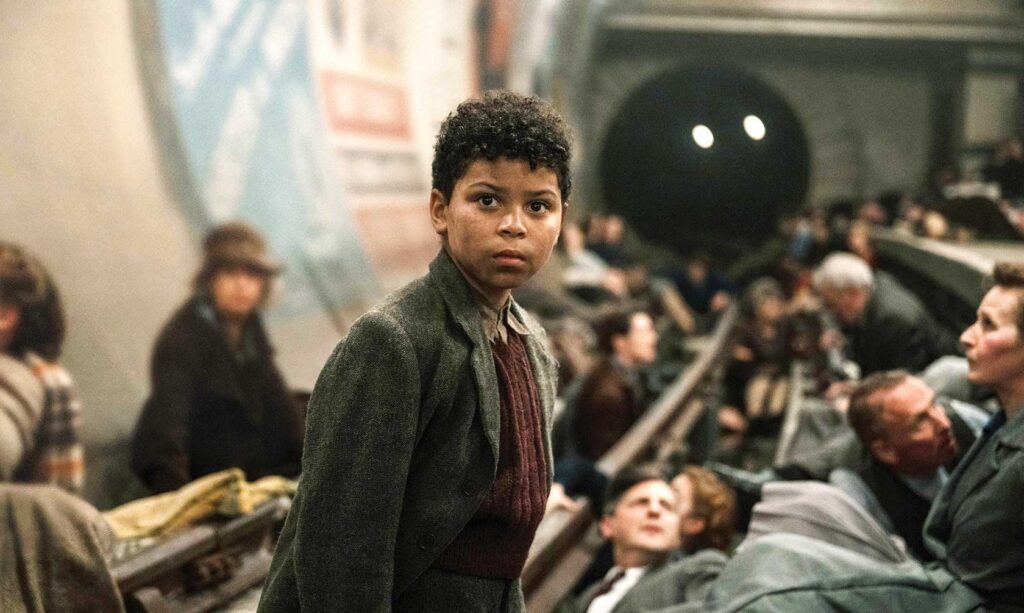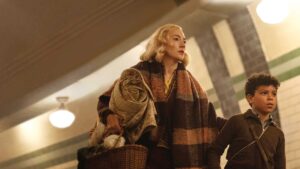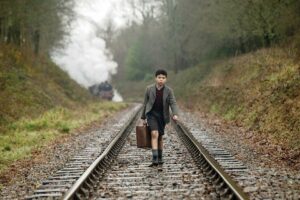Steve McQueen’s ‘Blitz’ shines poignant spotlight on children of war

Banner Arts & Culture Sponsored by Cruz Companies
In the United Kingdom from September 1940 to May 1941, cities like London were under attack in an eight-month-long aerial bombardment from Nazi Germany known as the Blitz. Blitz is short for blitzkrieg, German for “lightning war.” It was a military strategy used by Nazi Germany to shock, disorient and disorganize the British. The raids were mostly at night, causing residents to jolt awake upon hearing the warning sirens blasting and the roar of bombs overhead crashing into buildings and civilians indiscriminately. Some people if they were lucky only had moments to gather their loved ones and personal belongings and run to underground shelters and train stations before they reached capacity. British director Sir Steve McQueen (“12 Years a Slave”) uses the months long attacks for the backdrop of his newest film “Blitz.”
“Blitz” follows a 9-year-old biracial boy George (Elliott Heffernan) who tries to reunite with his single mother, Rita (Saoirse Ronan) after she sends him to the countryside to avoid the bombings. Defiant and brave, George absconds from journey to the country by jumping off a moving train in order to make his way back to the city while facing danger, disillusionment and occasional moments of levity.
McQueen writes, directs and produces a tale that is on the surface a simple one. War breaks out. Mother and son only have each other (and a charming piano playing grandfather as a surrogate father figure). They lose each other in the danger and chaos of the Second World War and use the remaining screen time to hopefully reunite.
Although the story arc is familiar, one of McQueen’s strengths is focusing on the aftermath and consequences of systemic human atrocities and oppression on a smaller and still very poignant scale. In one scene Rita, who is white, is at an integrated dance party with her partner Marcus, an Afro Caribbean man from Grenada. Through no fault of his own, Marcus is eventually taken into police custody and is never seen again by Rita or their son George, who has no recollection of him. Apathetic onlookers do nothing to help the situation.
With the loss of his father, George has a fraught relationship with his Black identity. His Blackness causes him to be bullied by the neighborhood children constantly. Although he has a loving and supportive family unit in his mother and grandfather, they don’t truly understand George’s plight of being a biracial child in England during the Second World War. At one point George declares he’s not Black until he meets a kind British-Nigerian police officer, Ife, who demonstrates that it is possible to be an honorable Black gentleman.
Another scene dramatizes the Café de Paris bombing of March 8, 1941 that killed at least 34 people and injured 80. One moment the big band is playing. People are drinking, dancing and laughing. The next scene depicts a destroyed nightclub with several dead bodies still sitting upright at tables; others are a collection of limbs on the floor. Looters are in the pitch-black club cutting off fingers to steal jewelry and other valuables from decapitated and mangled bodies. One looter seems giddy at the thought of making a fortune from the carnage. This is self-preservation at its worst.
The film is timely as social media and news outlets are flooded with images and videos of children dealing with the everyday atrocities of war, violence, trauma and familial separation. “Blitz” isn’t something that only happened in the mid twentieth century, it’s happening now in locations like Sudan, Gaza and Ukraine. McQueen’s choice to center the story on a child’s quest to return home manages to hold up a mirror to the viewer asking us who we are in difficult times. Are we like brave George who jumps off a moving train and goes toward danger to try to reunite with his family against the odds? Are we like Ife, the kind officer who tries to bring aid and comfort to those he can? Are we like the looters who are only concerned with self-preservation and material gain? Or are we the apathetic onlookers who choose not to interfere due to overwhelm, exhaustion or disillusionment? The answer may surprise you.
“Blitz” opened in theaters Nov. 1 and is now streaming on Apple TV+.









